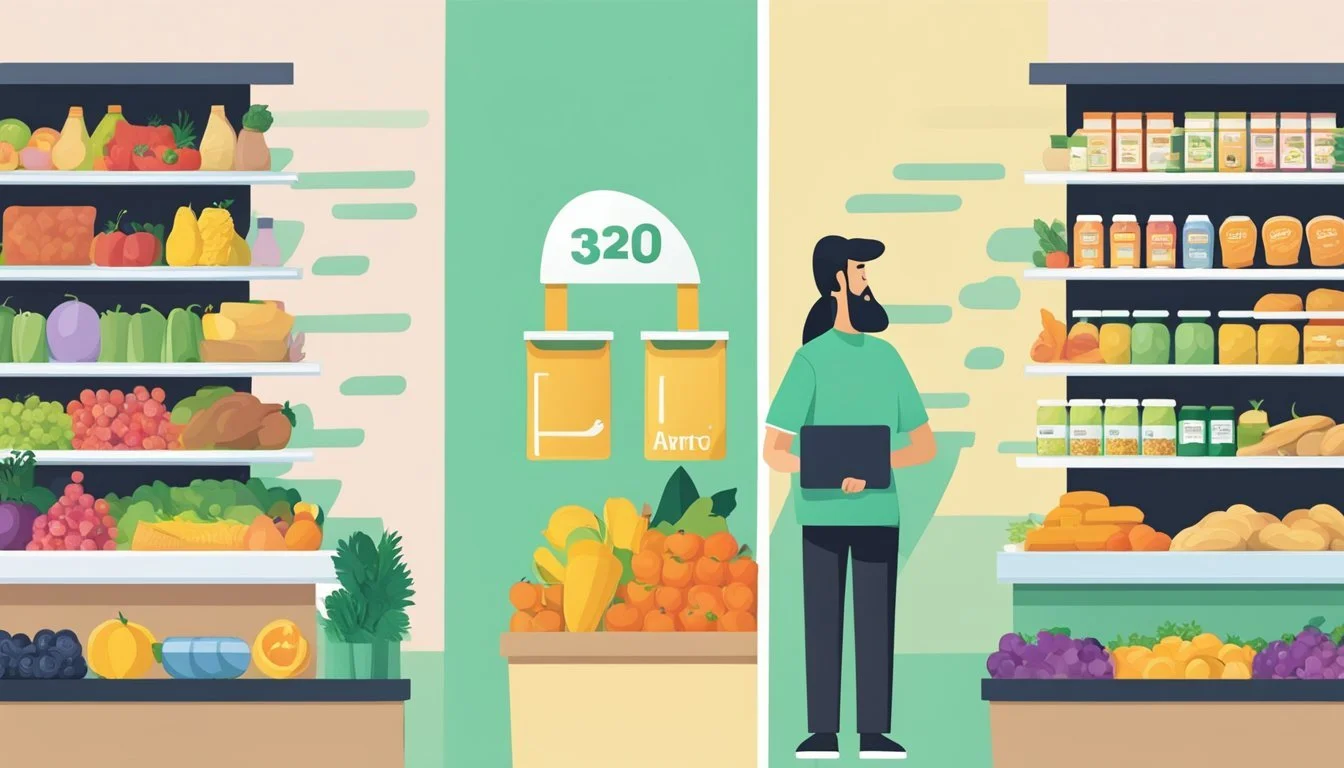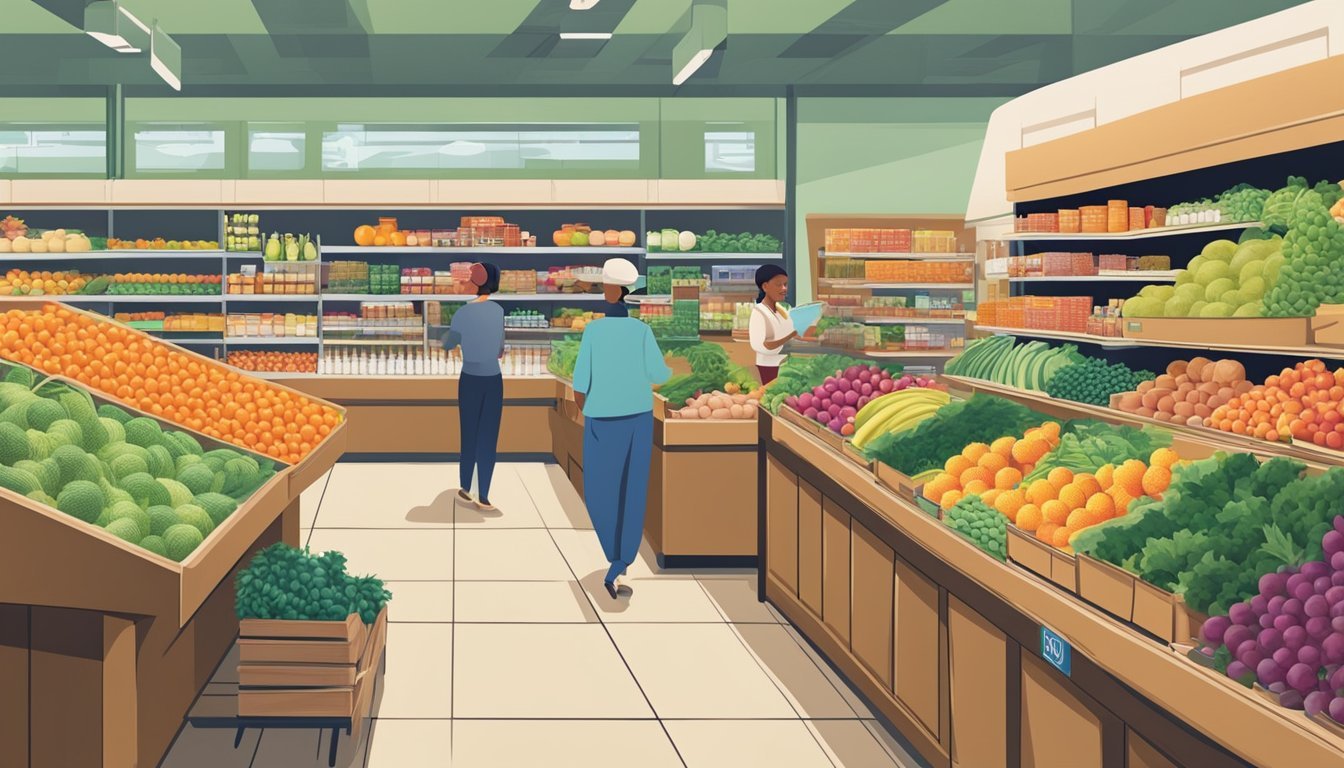Ralphs vs Sprouts
A Comprehensive Comparison of Prices, Quality, and Selection
Grocery shopping can be a balancing act between quality, affordability, and convenience. Ralphs and Sprouts Farmers Market are two popular grocery chains that offer distinct shopping experiences for consumers.
Ralphs, a subsidiary of Kroger, is known for its wide selection of traditional grocery items and competitive pricing. Sprouts Farmers Market, on the other hand, focuses on natural and organic products, with an emphasis on fresh produce and bulk foods. While Ralphs may offer lower prices on conventional items, Sprouts often provides better value for health-conscious shoppers seeking organic and specialty products.
The choice between these two stores ultimately depends on individual preferences and shopping habits. Ralphs might be the go-to for everyday essentials and name-brand products, while Sprouts could be preferred for its extensive produce section and natural food offerings. Understanding the strengths of each store can help shoppers make informed decisions about where to purchase their groceries.
Historical Background and Evolution
Ralphs and Sprouts Farmers Market represent two distinct eras in American grocery retail. Both have shaped the industry through innovation and adaptation to changing consumer needs.
The History of Ralphs
Ralphs started in 1873 when George Albert Ralphs opened a small grocery store in downtown Los Angeles. The company quickly gained popularity for its quality products and friendly service. In the early 1900s, Ralphs pioneered self-service shopping, allowing customers to select their own items.
By the 1920s, Ralphs had expanded to multiple locations across Southern California. The company introduced innovations like in-store bakeries and introduced its own brand of products. In 1968, Ralphs merged with Federated Department Stores, expanding its reach.
Kroger acquired Ralphs in 1999, further solidifying its position in the grocery market. Today, Ralphs operates over 180 stores, primarily in Southern California.
The Growth of Sprouts Farmers Market
Sprouts Farmers Market is a more recent entrant to the grocery scene. Founded in 2002 in Chandler, Arizona, by Stan and Shon Boney, Sprouts aimed to offer healthy, natural foods at affordable prices.
The company's rapid growth began almost immediately. By 2010, Sprouts had expanded to over 50 stores across multiple states. Its focus on fresh produce, bulk foods, and vitamins resonated with health-conscious consumers.
In 2011, Sprouts merged with Henry's Farmers Market, significantly expanding its footprint. The company went public in 2013, fueling further growth. As of 2024, Sprouts operates over 340 stores across 23 states.
Sprouts has maintained its commitment to natural and organic products, positioning itself as a bridge between conventional supermarkets and specialty health food stores.
Store Presence and Accessibility
Ralphs and Sprouts have different approaches to their store networks and geographic reach. Ralphs focuses on a strong regional presence, while Sprouts pursues nationwide expansion.
Ralphs' Store Network
Ralphs operates over 180 stores, primarily concentrated in Southern California. The chain has a dense network in major metropolitan areas like Los Angeles, San Diego, and Orange County. This regional focus allows Ralphs to tailor its offerings to local preferences and maintain efficient supply chains.
Many Ralphs locations are situated in convenient urban and suburban areas, often anchoring shopping centers or strip malls. The stores are typically larger format supermarkets, ranging from 50,000 to 70,000 square feet. This size accommodates a wide variety of departments and product selections.
Sprouts' Expansion and Reach
Sprouts Farmers Market has grown rapidly since its founding in 2002, now operating approximately 340 stores across 23 states. The chain initially focused on the Southwest but has expanded into other regions, including the Southeast, Mid-Atlantic, and Pacific Northwest.
Sprouts targets health-conscious consumers and often chooses locations in middle to upper-income neighborhoods. Their stores are generally smaller than traditional supermarkets, averaging around 30,000 square feet. This compact format allows Sprouts to fit into a variety of retail spaces and shopping centers.
The company continues to pursue an aggressive growth strategy, aiming to open 30 new stores annually. This expansion increases accessibility for customers seeking natural and organic products across the United States.
Product Range and Quality
Ralphs and Sprouts offer distinct product selections tailored to different consumer preferences. Each store's inventory reflects its unique positioning in the grocery market.
Variety of Products at Ralphs
Ralphs provides a comprehensive range of grocery items. Their shelves stock national brands alongside store-brand alternatives. Produce sections feature both conventional and organic fruits and vegetables.
Ralphs' meat department offers various cuts and types, including beef, pork, poultry, and seafood. The bakery produces fresh bread, cakes, and pastries daily. Dairy aisles contain milk, cheese, yogurt, and eggs from multiple brands.
The store's selection extends beyond food. Customers can find household goods, personal care items, and over-the-counter medications. Ralphs also maintains a dedicated section for beer, wine, and spirits in many locations.
Organic Focus of Sprouts
Sprouts Farmers Market emphasizes natural and organic products. Their produce department forms the store's centerpiece, offering a wide array of fresh fruits and vegetables. Organic options are abundant, with clear labeling for easy identification.
The store's bulk section allows customers to purchase nuts, grains, and dried fruits in desired quantities. Sprouts' meat counter features antibiotic-free and grass-fed options. Their dairy case stocks organic milk, artisanal cheeses, and plant-based alternatives.
Sprouts carries an extensive selection of vitamins, supplements, and natural body care products. The bakery produces fresh bread using organic ingredients. While less diverse than traditional supermarkets in non-food items, Sprouts excels in natural and organic food choices.
Pricing Strategies and Deals
Ralphs and Sprouts employ different pricing approaches and offer various deals to attract customers. Their strategies impact overall value and potential savings for shoppers.
Comparing Prices at Ralphs and Sprouts
Ralphs typically offers competitive prices on a wide range of grocery items. The store focuses on providing everyday low prices on staple products.
Sprouts, on the other hand, is known for its affordable organic and natural foods. The store often has lower prices on produce and bulk items compared to traditional supermarkets.
Recent price comparisons show that Sprouts' prices have increased slightly. In some cases, Sprouts is now 1.3% more expensive than competitors like Whole Foods for certain products.
Discounts and Loyalty Programs
Ralphs offers a loyalty program that provides personalized discounts and digital coupons. Members can accumulate points for fuel savings and receive exclusive weekly deals.
Sprouts has its own rewards program, offering digital coupons and special promotions to members. The program provides tailored discounts based on shopping habits.
Both stores frequently run sales and promotions on seasonal items and popular products. These discounts can lead to significant savings for savvy shoppers.
Deals and Savings Opportunities
Ralphs often features "Buy One, Get One Free" deals on select items. The store also offers digital coupons that can be loaded onto loyalty cards for easy redemption.
Sprouts is known for its "Double Ad Wednesdays," where shoppers can take advantage of deals from both the previous and upcoming week's sales flyers.
Both stores have embraced e-commerce platforms, offering online ordering and mobile apps. These digital tools often provide exclusive online deals and make it easier for customers to track promotions.
Weekly sales circulars from both Ralphs and Sprouts highlight current deals and can help shoppers plan their purchases for maximum savings.
Shopping Experience and Services
Ralphs and Sprouts offer distinct shopping environments and amenities tailored to different customer preferences. Each store provides unique services and assistance to enhance the grocery shopping experience.
Customer Service and Assistance
Ralphs, as part of the Kroger family, emphasizes a traditional supermarket approach. Staff members are typically available throughout the store to assist customers with product inquiries and location. The store layout is designed for efficiency, with wide aisles and clear signage.
Sprouts focuses on a more intimate, farmers market-inspired atmosphere. Employees are often knowledgeable about natural and organic products, offering personalized recommendations. The produce section is centrally located, creating a vibrant, fresh feel.
Both chains prioritize customer satisfaction, but their approaches differ. Ralphs tends to have more checkout lanes open during peak hours, potentially reducing wait times. Sprouts may have fewer registers but often compensates with attentive, quick service.
Additional Services Offered
Ralphs provides a range of conveniences, including in-store pharmacies, fuel centers at select locations, and dedicated floral departments. Many stores feature deli counters with prepared foods and made-to-order sandwiches. Digital coupons and a loyalty program offer savings opportunities.
Sprouts distinguishes itself with an extensive bulk foods section, allowing customers to purchase precise quantities. The stores often include vitamin departments with knowledgeable staff. Sprouts' mobile app provides digital coupons and weekly ads.
Both chains offer online ordering with pickup and delivery options, catering to the growing demand for convenience. Ralphs leverages its larger footprint to provide a broader range of non-grocery items, while Sprouts concentrates on health-focused products and supplements.
Branding and Market Position
Ralphs and Sprouts occupy distinct positions in the grocery market, appealing to different customer segments through their unique branding strategies. Their market positions and brand images reflect their core values and target demographics.
Market Position of Ralphs
Ralphs, a subsidiary of Kroger, holds a strong position as a mainstream grocery chain. It offers a wide range of products, including national brands and its own store brands.
Ralphs caters to a broad customer base, focusing on value and convenience. The store's layout typically includes full-service departments like bakery, deli, and pharmacy.
With over 180 locations in Southern California, Ralphs maintains a significant market share in the region. Its competitive pricing on common items attracts budget-conscious shoppers.
Ralphs' loyalty program, part of Kroger's broader rewards system, helps build brand loyalty among regular customers. This strategy aims to retain shoppers in a highly competitive grocery market.
Brand Image of Sprouts
Sprouts Farmers Market positions itself as a health-focused, specialty grocery store. Its brand image centers on fresh, natural, and organic products at affordable prices.
The store layout mimics a farmers market, emphasizing produce and bulk foods. This design reinforces Sprouts' image as a source for healthy, wholesome options.
Sprouts targets health-conscious consumers and those seeking alternatives to conventional groceries. Its smaller store format creates a more intimate shopping experience compared to larger chains.
The company's rapid expansion, growing from a single store in 2002 to over 340 locations, demonstrates strong consumer appeal. Sprouts' commitment to sustainability and natural products resonates with environmentally conscious shoppers.
While offering some national brands, Sprouts emphasizes its own label products, aligning with its health-oriented brand identity. This strategy helps differentiate Sprouts from mainstream competitors like Ralphs.
Consumer Preferences and Trends
Shifting consumer preferences are reshaping the grocery landscape, with a growing emphasis on health-conscious choices and product quality. Shoppers increasingly seek out stores that align with their values and lifestyles.
Trends in Organic and Natural Foods
Organic produce and natural foods have seen a surge in popularity. According to recent surveys, 73% of consumers purchase organic products at least occasionally. This shift is driven by health concerns and environmental awareness. Stores like Sprouts and Whole Foods have capitalized on this trend, expanding their organic offerings.
Fresh food sections have become focal points in grocery stores. Consumers prioritize high-quality fruits, vegetables, and meats. This emphasis on freshness has led to expanded produce departments and in-store prep areas for ready-to-eat meals.
Consumer Demand for Quality and Variety
Product quality ranks as a top priority for shoppers. Consumer Reports found that 78% of customers consider quality "very important" when choosing a grocery store. This preference extends beyond just fresh items to packaged goods and private-label products.
Variety is another key factor influencing store choice. Consumers seek diverse options to accommodate dietary restrictions and culinary interests. Stores that offer a wide range of international foods, specialty products, and health-oriented items tend to score higher in customer satisfaction surveys.
Health-oriented products continue to gain traction. From gluten-free options to plant-based alternatives, grocers are expanding their selections to meet evolving dietary preferences. This trend aligns with the broader shift towards healthier lifestyles among consumers.
Sustainability and Community Impact
Sprouts Farmers Market and Ralphs both demonstrate commitments to sustainability and community engagement, though their approaches differ. Each retailer has implemented environmental initiatives and local outreach programs that reflect their brand values and priorities.
Environmental Initiatives
Sprouts Farmers Market emphasizes sustainability throughout its operations. The company focuses on reducing food waste through partnerships with local food banks and composting programs. Sprouts has also implemented energy-efficient lighting and refrigeration systems in its stores to decrease its carbon footprint.
Ralphs, as part of the Kroger family, has set ambitious sustainability goals. The company aims to achieve zero waste to landfills by 2025. Ralphs stores feature recycling stations for plastic bags and have increased their use of reusable packaging.
Both retailers prioritize offering organic fruits and natural products, reducing the environmental impact of conventional farming practices.
Local Community Engagement
Sprouts Farmers Market takes pride in its community involvement. The company has donated $20 million to local nonprofit partners since 2015. Sprouts encourages its associates to volunteer, resulting in 5,500 service hours donated.
Ralphs actively supports local food banks and hunger relief programs. The company partners with regional farmers to source local produce, supporting small businesses and reducing transportation emissions.
Both retailers offer educational programs on nutrition and healthy eating. These initiatives aim to improve community health and well-being.
Sprouts and Ralphs host in-store events and fundraisers for local charities, fostering strong connections with their neighborhoods.
Conclusions and Final Thoughts
Ralphs and Sprouts Farmers Market cater to different consumer preferences in the grocery shopping landscape. Sprouts excels in offering natural and organic products, appealing to health-conscious shoppers.
Ralphs provides a wider selection of conventional grocery items and often has more competitive pricing on everyday essentials. Its larger stores typically stock a broader range of national brands.
Sprouts stands out for its extensive produce section and bulk foods department. The store emphasizes fresh, seasonal fruits and vegetables at reasonable prices.
Value-conscious consumers may find better deals at Ralphs, especially on non-organic items. However, Sprouts frequently offers competitive prices on organic produce and natural products.
The choice between Ralphs and Sprouts ultimately depends on individual shopping priorities. Those seeking conventional groceries and familiar brands may prefer Ralphs.
Shoppers focused on natural and organic options will likely appreciate Sprouts' specialized inventory. Both stores have their strengths, and many consumers choose to shop at both depending on their needs.
Store location and convenience also play a role in consumer decisions. Some may opt for whichever supermarket is closer or easier to access.
Loyalty programs and weekly specials can impact value at both chains. Savvy shoppers often compare circulars to maximize savings across stores.








